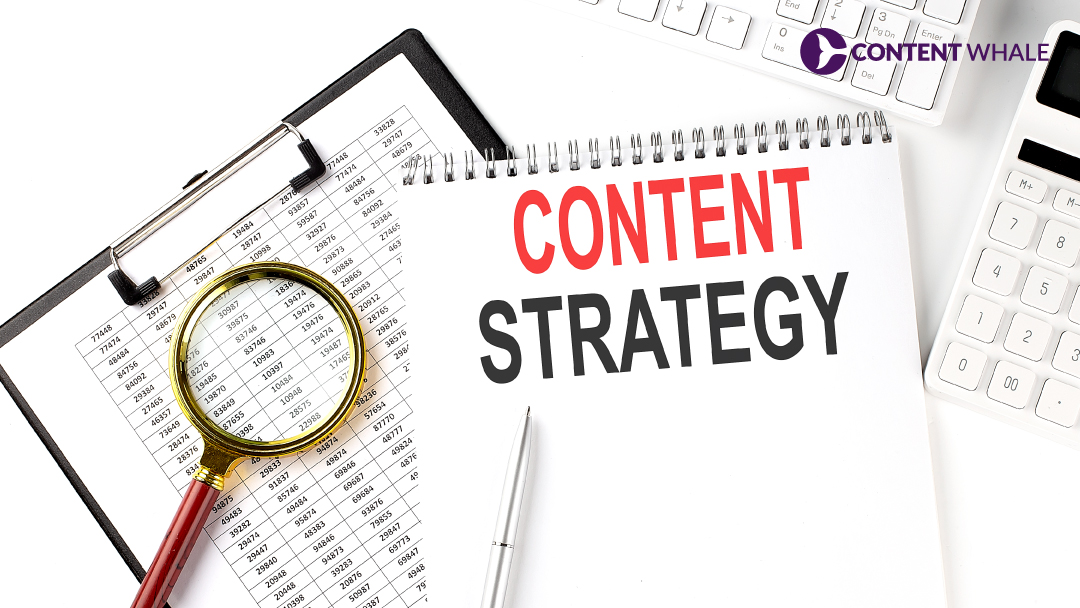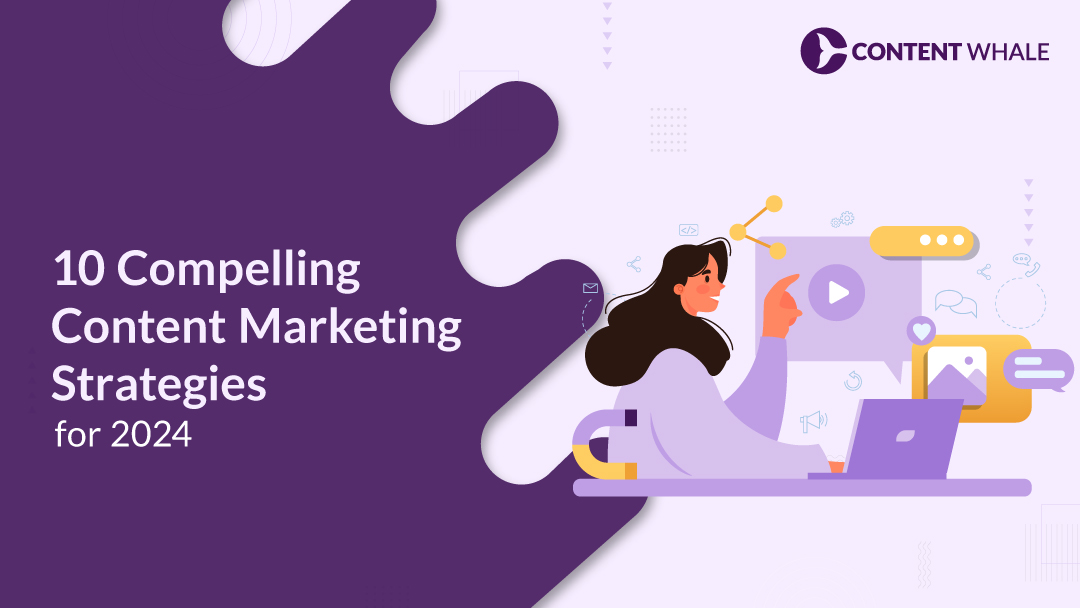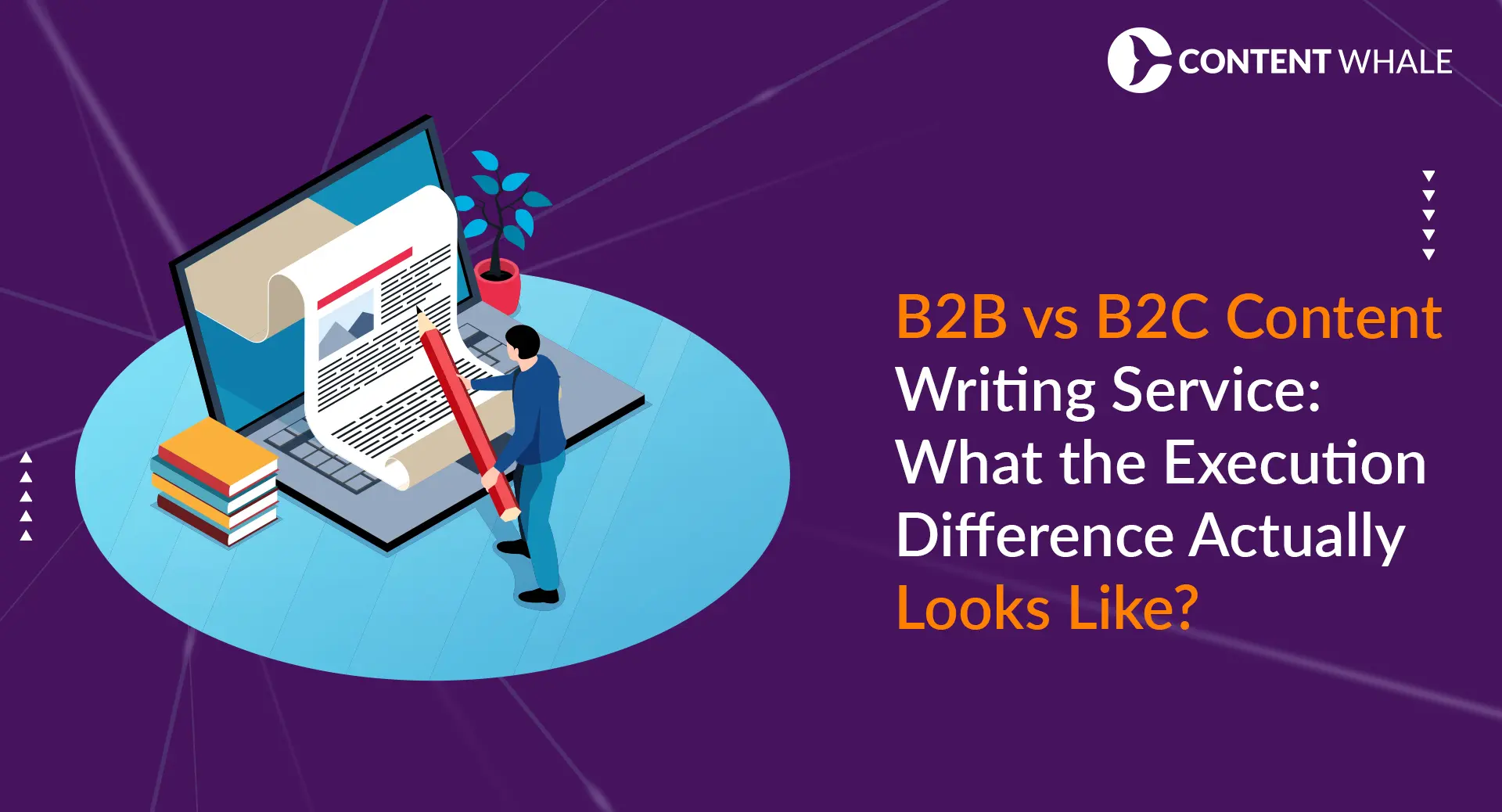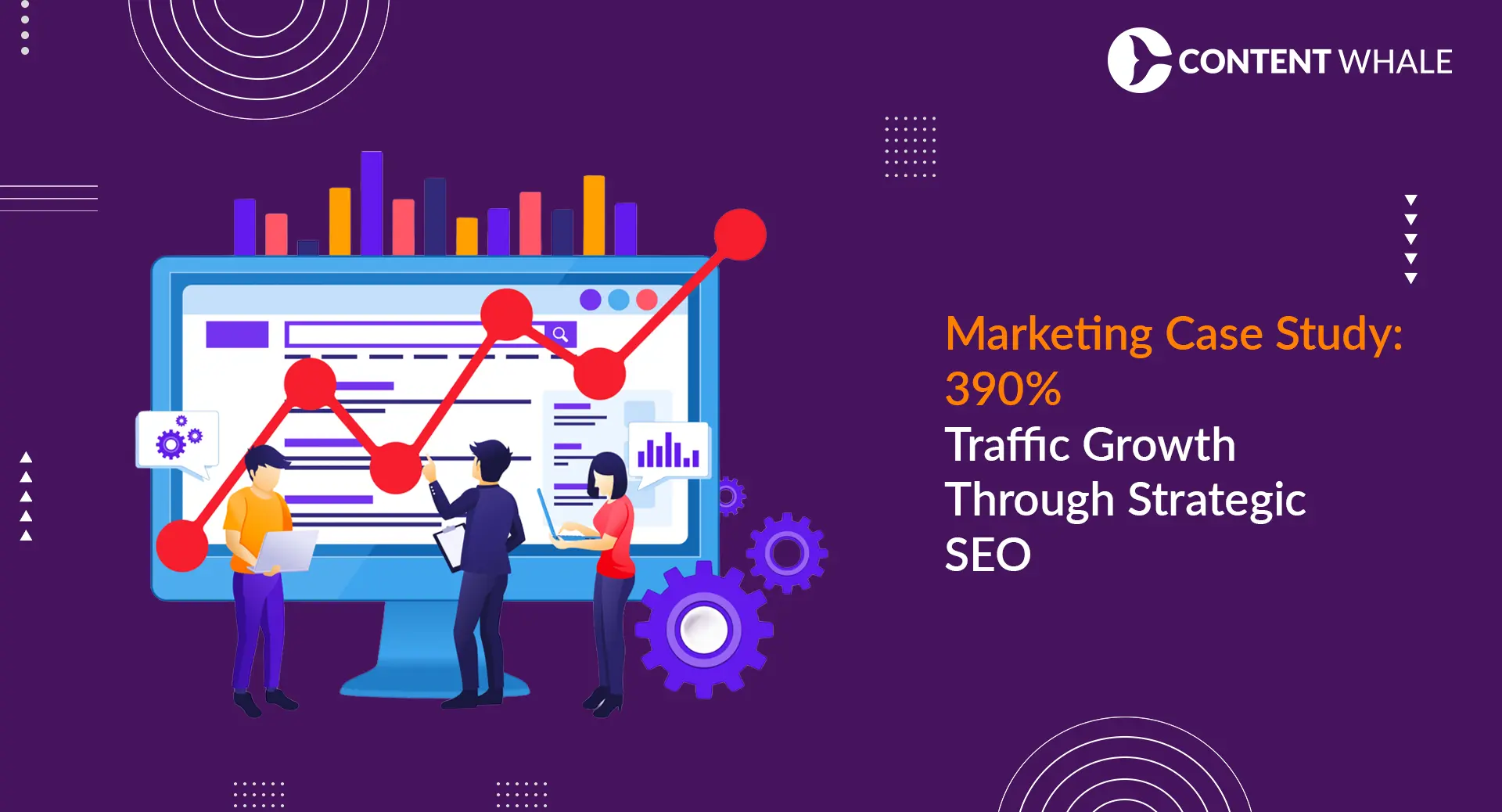Quick Summary
Discover the top content marketing strategies for 2024, designed to boost engagement and drive growth. This blog covers practical content marketing tips on leveraging video content, personalization, interactive elements, influencer collaborations, SEO, social media, email marketing, data-driven strategies, and sustainability. Learn how to implement these effective content marketing techniques to stay ahead. Content Whale can help you create and execute these strategies, ensuring your content is compelling and impactful.
Staying updated with the latest content marketing strategies is essential for any business aiming to stay competitive in 2024. As digital trends shift rapidly, understanding and adapting to these changes can significantly impact your marketing success. This blog will explore the best content marketing strategies to adopt in the coming year.
Do you know that 45% of B2B marketers expect their content marketing budget to increase in 2024? Moreover, 69% of these marketers plan to invest more in video content, reflecting the growing importance of dynamic and engaging media in reaching audiences effectively.
This guide will focus on ten effective content marketing methods that are set to dominate. From leveraging video content to embracing sustainability and ethical marketing, each strategy offers unique content marketing tips to enhance engagement and drive growth. Whether you’re a seasoned marketer or just starting out, these insights will help you navigate the dynamic digital marketing environment of 2024.
Ready to transform your content marketing approach? Let’s dive into the top strategies that will shape your success in the coming year.
1. Leveraging Video Content
Video content continues to dominate the digital space, becoming a vital part of content marketing strategies for 2024. Its ability to capture attention and convey messages effectively makes it a preferred medium for marketers and consumers alike.
According to recent studies, 82% of consumers say that watching a video has convinced them to purchase from a brand. This statistic highlights the power of video in driving conversions and engaging audiences. To leverage this trend, focus on creating high-quality, engaging videos that tell your brand’s story in a compelling way.
When developing your video content, consider these content marketing tips:
I) Storytelling: Use narratives to connect emotionally with your audience. Storytelling makes your content more relatable and memorable.
II) Short and Long-Form Content: Mix short-form videos for quick engagement on platforms like TikTok and Instagram with longer, more in-depth videos for YouTube and your website.
III) Optimization: Ensure your videos are optimized for each platform’s specifications and audience preferences. This includes using appropriate video lengths, formats, and interactive elements like polls and Q&A sessions.
By integrating video into your content marketing strategies, you can enhance engagement and drive significant growth. Whether you’re showcasing product demos, sharing customer testimonials, or creating educational content, videos can effectively convey your message and resonate with your audience.
Platforms like YouTube, TikTok, and Instagram are perfect for implementing these best content marketing strategies. These platforms offer diverse features that can help you reach and engage with your target audience more effectively.
2. Personalization and Customization
Personalization has become a cornerstone of content marketing strategies in recent years, and its importance will only grow in 2024. Delivering personalized content can significantly enhance user experience, increase engagement, and drive conversions.
Do you know that 80% of consumers are more likely to buy from a company that offers personalized experiences? This highlights the effectiveness of personalized content in meeting consumer expectations and boosting brand loyalty.
Here are some content marketing tips for effective personalization:
I) Leverage User Data: Utilize data from user interactions, purchase history, and behavior on your site to tailor content to individual preferences. This data-driven approach helps in creating relevant and engaging content.
II) Employ AI and Automation: Tools like AI-powered recommendations and automated email campaigns can deliver personalized content at scale. These technologies analyze user data to provide customized content suggestions, enhancing the user experience.
III) Segment Your Audience: Divide your audience into specific segments based on criteria such as demographics, interests, and past interactions. Craft content that caters to the unique needs and preferences of each segment to increase relevance and engagement.
Implementing these techniques can significantly improve the effectiveness of your content marketing strategies. By delivering personalized and customized content, you can foster a deeper connection with your audience, leading to higher engagement and loyalty.
Using tools like HubSpot, Marketo, and other personalization platforms can streamline this process, making it easier to manage and execute personalized content campaigns. These platforms offer robust analytics and automation features, ensuring that your personalization efforts are both effective and efficient.
Incorporate these best content marketing strategies to stay ahead of the competition and provide your audience with the personalized experiences they crave.
3. Interactive Content

Interactive content is becoming a game-changer in content marketing strategies. It offers a dynamic way to engage and retain your audience. Unlike static content, interactive elements encourage users to participate actively, making their experience more memorable and impactful.
Do you know that 93% of marketers believe that interactive content is more effective at educating buyers compared to static content? This statistic underscores the power of interactive elements in driving user engagement and learning.
Here are some content marketing tips for creating and promoting interactive content:
I) Quizzes and Polls: Quizzes and polls are fun and engaging ways to capture user interest. They not only entertain but also provide valuable insights into user preferences and behaviors. Platforms like Typeform and SurveyMonkey make it easy to create these interactive elements.
II) Interactive Infographics: Transform traditional infographics into interactive experiences. Allow users to click on different sections to reveal more detailed information. This approach can significantly enhance user engagement and information retention.
III) Interactive Videos: Incorporate clickable elements within your videos, such as hotspots, branching scenarios, and embedded forms. These features can guide viewers through a personalized journey, increasing their engagement and interaction with your content.
Integrating interactive content into your content marketing strategies can provide a more engaging and enjoyable experience for your audience. This approach not only boosts user engagement but also helps in collecting valuable data that can inform future content creation efforts.
For effective implementation, consider using tools like Ceros, Outgrow, and Ion Interactive. These tools offer a range of features to create compelling interactive content. They can help you bring your ideas to life and provide your audience with an immersive and engaging experience.
4. Content Repurposing
Repurposing content is a powerful way to maximize the value of your existing materials. It involves transforming content into different formats to reach a broader audience, making it a staple in content marketing strategies for 2024.
Do you know that 48% of content marketers say not enough content repurposing is one of their biggest challenges? This highlights the importance of repurposing in maintaining a consistent and efficient content output.
Here are some content marketing tips for effective content repurposing:
I) Transform Blog Posts into Videos: Take your top-performing blog posts and convert them into engaging video content. This can help you reach audiences who prefer video over text. Use platforms like YouTube and Instagram to share these videos and drive more traffic to your site.
II) Convert Webinars into Articles: Webinars are rich with valuable information that can be repurposed into detailed articles or blog posts. This not only extends the lifespan of the webinar content but also provides an opportunity to delve deeper into the topics covered.
III) Turn Podcasts into Infographics: Podcasts are great for in-depth discussions, but they can also be visually represented through infographics. Highlight key points and statistics from podcast episodes in a visually appealing format to share on social media or your website.
IV) Create Social Media Snippets: Break down longer pieces of content, like whitepapers or eBooks, into bite-sized social media posts. This makes the content more digestible and shareable, increasing your reach and engagement on platforms like LinkedIn and Twitter.
Repurposing content across various formats not only saves time and resources but also ensures that your message reaches different segments of your audience. It’s one of the best content marketing strategies for maintaining a consistent presence across multiple channels.
Using tools like Canva for infographics, Adobe Premiere Pro for video editing, and Anchor for podcasting can streamline your repurposing efforts. These tools help transform your content efficiently, making the process seamless and effective.
Implementing these effective content marketing tactics can help you get more mileage out of your existing content, ensuring it continues to drive engagement and deliver value long after its initial publication.
5. Influencer Collaborations

Collaborating with influencers has become one of the most impactful content marketing strategies. Influencers can amplify your content’s reach and credibility, tapping into their established audience base to promote your brand effectively.
Do you know that 86% of marketers found influencer marketing to be effective for their companies in 2023? This trend is expected to grow, with more businesses recognizing the value of influencers in their marketing mix.
Here are some content marketing tips for successful influencer collaborations:
I) Identify Relevant Influencers: Choose influencers who align with your brand values and target audience. Look for those with genuine engagement and credibility within your industry. Tools like BuzzSumo and Upfluence can help you find the right influencers.
II) Build Genuine Relationships: Instead of approaching influencers with a transactional mindset, focus on building long-term relationships. Engage with their content, provide value, and collaborate on projects that benefit both parties.
III) Create Authentic Content: Allow influencers the creative freedom to produce content that resonates with their audience. Authenticity is key, as audiences are more likely to trust and engage with content that feels genuine and personal.
IV) Measure Impact: Use metrics such as engagement rates, website traffic, and conversion rates to assess the success of your influencer collaborations. Tools like Google Analytics and social media insights can provide valuable data on your campaigns’ performance.
By integrating influencer partnerships into your content marketing strategies, you can leverage their reach and credibility to enhance your brand visibility. Influencers can create engaging and relatable content that resonates with their audience, driving higher engagement and conversions.
These best content marketing strategies not only expand your reach but also add a layer of trust and authenticity to your marketing efforts. Collaborating with the right influencers can significantly boost your brand’s presence and effectiveness in the competitive digital space.
6. SEO Optimization
SEO remains a cornerstone of content marketing strategies, ensuring that your content reaches the right audience by ranking high on search engines. Optimizing your content for search engines increases visibility, drives organic traffic, and boosts engagement.
Do you know that 68% of online experiences begin with a search engine? This statistic emphasizes the importance of SEO in guiding potential customers to your content.
Here are some content marketing tips for effective SEO optimization:
I) Voice Search Optimization: With the rise of voice-activated devices, optimizing your content for voice search is crucial. Focus on natural language and question-based queries, as users typically ask questions when using voice search.
II) Mobile-First Indexing: Google prioritizes mobile-friendly sites in its search rankings. Ensure your website is responsive and provides a seamless experience on mobile devices. This includes fast load times, easy navigation, and mobile-optimized content.
III) Keyword Research: Use tools like SEMrush, Ahrefs, and Google Keyword Planner to identify relevant keywords for your industry. Incorporate these keywords naturally into your content, including in titles, headers, and meta descriptions.
IV) High-Quality Backlinks: Backlinks from reputable sites enhance your domain authority and improve search rankings. To earn quality backlinks, focus on building relationships with industry influencers and guest blogging on high-authority websites.
V) Content Quality: High-quality, informative content that addresses user intent is crucial. Google rewards content that provides value and answers users’ queries effectively. Ensure your content is well-researched, up-to-date, and comprehensive.
By incorporating these best content marketing strategies, you can improve your website’s SEO and drive more organic traffic. Effective SEO optimization not only enhances your online visibility but also ensures that your content reaches the right audience, ultimately leading to higher engagement and conversions.
Using these effective content marketing techniques will help your content stand out in search engine results, making it easier for potential customers to find and engage with your brand.
7. Social Media Engagement

Social media plays a vital role in content marketing strategies, serving as a key platform for content distribution and audience engagement. With the ever-growing number of social media users, leveraging these platforms effectively can significantly enhance your marketing efforts.
Do you know that 73% of marketers say social media has been somewhat or very effective for their business? This highlights the importance of a strong social media presence in your overall marketing strategy.
Here are some content marketing tips for boosting social media engagement:
I) Create Engaging Content: Develop content that resonates with your audience. Use a mix of images, videos, polls, and stories to keep your social media feed diverse and engaging. Platforms like Canva can help you create visually appealing content.
II) Consistency is Key: Post regularly to maintain a consistent presence. This helps in keeping your audience engaged and ensures that your brand remains top-of-mind. Tools like Hootsuite and Buffer can help you schedule and manage your posts effectively.
III) Leverage Hashtags and Trends: Use relevant hashtags to increase the discoverability of your posts. Participate in trending topics and challenges to enhance visibility and engagement. This tactic works particularly well on platforms like Instagram and Twitter.
IV) Engage with Your Audience: Respond to comments, messages, and mentions promptly. Engaging with your audience fosters a sense of community and builds stronger relationships. Regular interaction can also help in understanding your audience’s preferences better.
V) Analyze Performance: Use analytics tools provided by social media platforms to track the performance of your posts. Understanding metrics like reach, engagement, and click-through rates can help you refine your strategy and improve future content.
Incorporating these best content marketing strategies into your social media plan can significantly boost engagement and drive growth. Effective social media management not only helps you reach a wider audience but also builds a loyal community around your brand.
8. Email Marketing Campaigns
Email marketing remains a powerful tool in content marketing strategies, offering a direct and personal way to reach your audience. Well-crafted email campaigns can nurture leads, boost conversions, and build lasting relationships with your customers.
Do you know that 87% of marketers plan to increase their email marketing investment in 2024? This underscores the importance of email as a key component of effective marketing.
Here are some content marketing tips for successful email marketing campaigns:
I) Segment Your Email List: Divide your email list into segments based on demographics, purchase history, and engagement levels. Segmentation allows you to send more personalized and relevant content to each group, increasing the chances of engagement.
II) Craft Compelling Subject Lines: Your subject line is the first thing recipients see, so make it count. Use attention-grabbing and concise language to encourage opens. Personalizing the subject line with the recipient’s name can also improve open rates.
III) Focus on Quality Content: Provide value in your emails by sharing insightful, helpful, and engaging content. This can include industry news, how-to guides, product updates, and special offers. Ensure that your emails are well-designed and easy to read on both desktop and mobile devices.
IV) Include Clear Calls-to-Action (CTAs): Every email should have a clear CTA that guides the recipient on what to do next, whether it’s visiting your website, signing up for a webinar, or making a purchase. Make your CTAs prominent and easy to click.
V) Test and Optimize: Regularly test different elements of your emails, such as subject lines, content, and send times, to see what works best. Use A/B testing to compare variations and optimize your emails for better performance. Analyze metrics like open rates, click-through rates, and conversion rates to refine your strategy.
Incorporating these best content marketing strategies into your email campaigns can significantly enhance their effectiveness.
By sending personalized, valuable, and engaging emails, you can foster stronger relationships with your audience and drive meaningful results.
9. Data-Driven Content Strategies

Utilizing data to inform your content marketing strategies is a game-changer. Data-driven approaches enable you to create more targeted and effective content, ensuring your efforts yield the best possible results.
Do you know that 61% of marketers say that AI is the most essential aspect of their data strategy? This highlights the importance of leveraging data and AI to enhance your content marketing efforts.
Here are some content marketing tips for implementing data-driven content strategies:
I) Gather and Analyze Data: Use analytics tools like Google Analytics, HubSpot, and SEMrush to gather data on your audience’s behavior, preferences, and interactions with your content. Analyzing this data helps you understand what works and what doesn’t, allowing you to refine your strategies.
II) Audience Segmentation: Divide your audience into specific segments based on data such as demographics, interests, and past behavior. This enables you to tailor your content to each segment’s unique needs and preferences, resulting in more relevant and engaging content.
III) Personalized Content: Use the insights gained from your data analysis to create personalized content that resonates with your audience. Personalization can significantly improve engagement and conversion rates, as it makes your audience feel valued and understood.
IV) Performance Metrics: Track key performance metrics such as conversion rates, click-through rates, and engagement levels. These metrics provide valuable feedback on the effectiveness of your content, helping you identify areas for improvement and optimize your strategy.
V) Content Optimization: Continuously optimize your content based on data insights. This includes updating old content to improve its relevance and SEO performance, as well as experimenting with different content formats and topics to see what resonates best with your audience.
By incorporating these best content marketing strategies, you can ensure that your content is data-driven and highly effective. Leveraging data not only helps in creating more targeted and relevant content but also enhances your ability to measure and improve your marketing efforts continuously.
These effective content marketing techniques will help you make informed decisions, optimize your content strategy, and achieve better results in 2024.
Using data to drive your content creation and distribution ensures that your efforts are always aligned with your audience’s needs and preferences.
10. Sustainability and Ethical Marketing
Sustainability and ethical practices are becoming increasingly important in content marketing strategies. Consumers are more conscious of the environmental and social impact of their purchases, and brands that align with these values can build stronger connections and loyalty with their audience.
Do you know that 88% of consumers want brands to help them make a difference? This statistic highlights the growing demand for brands to adopt sustainable and ethical practices.
Here are some content marketing tips for incorporating sustainability and ethical marketing into your strategy:
I) Highlight Sustainable Practices: Share your brand’s commitment to sustainability through your content. This can include information about eco-friendly products, sustainable sourcing, and efforts to reduce your carbon footprint. Transparency is key, so be open about your practices and goals.
II) Ethical Storytelling: Use storytelling to convey your brand’s ethical values. Share stories about your partnerships with ethical suppliers, community involvement, and initiatives to support social causes. Authentic stories resonate deeply with audiences and can differentiate your brand.
III) Promote Eco-Friendly Products: Focus on promoting products that are environmentally friendly. Highlight their benefits, such as reduced waste, recyclable materials, or energy efficiency. Educating consumers about the advantages of sustainable products can drive more eco-conscious purchasing decisions.
IV) Engage in Social Responsibility: Show your audience that you care about social issues. Participate in or sponsor community events, support charitable organizations, and create content that raises awareness about important social causes. This demonstrates your brand’s commitment to making a positive impact.
V) Use Sustainable Content Formats: Consider the environmental impact of your content production. Opt for digital formats over print when possible, and choose eco-friendly printing options if you need physical materials. Additionally, ensure your digital content is optimized to reduce energy consumption.
Integrating these practices into your content marketing strategies not only helps the environment but also strengthens your brand’s reputation and trustworthiness. Consumers are more likely to support brands that share their values and are committed to making a positive impact.
By following these best content marketing strategies, you can align your brand with the growing movement toward sustainability and ethical marketing.
Here is a table summarising all the tools which we talked in this guide:
| Tool Name | Features | Best For |
|---|---|---|
| Google Analytics | Tracks website traffic, user behavior, conversion rates, and audience demographics. Provides detailed reports and insights. | Analyzing audience behavior, tracking conversions, and optimizing content strategies. |
| HubSpot | Comprehensive marketing automation, CRM integration, email marketing, analytics, and personalized content delivery. | Creating personalized content, email marketing, and detailed analytics. |
| SEMrush | Keyword research, SEO audits, competitor analysis, content optimization, and backlink tracking. | SEO optimization, keyword research, and competitive analysis. |
| Ahrefs | Backlink analysis, keyword research, site audits, rank tracking, and content research. | SEO strategies, tracking backlinks, and content optimization. |
| Canva | Easy-to-use design tool, templates for social media graphics, infographics, presentations, and marketing materials. | Creating visually appealing content, infographics, and social media posts. |
| Hootsuite | Social media scheduling, content curation, analytics, and team collaboration tools. | Managing and scheduling social media posts, tracking performance, and team collaboration. |
| Buffer | Social media management, post scheduling, analytics, and engagement tracking. | Scheduling social media content and analyzing engagement. |
| BuzzSumo | Content research, influencer identification, trend analysis, and social media monitoring. | Finding content ideas, identifying influencers, and tracking trends. |
| Upfluence | Influencer marketing platform, influencer search, campaign management, and analytics. | Finding and managing influencer collaborations, and tracking campaign performance. |
| Ceros | Interactive content creation, design tools, and analytics. No coding required. | Creating interactive content like infographics, eBooks, and microsites. |
| Outgrow | Interactive content tools including calculators, quizzes, assessments, and polls. | Engaging users with interactive content and collecting data. |
| Ion Interactive | Interactive content creation, optimization, and analytics. | Building and optimizing interactive content experiences. |
| Adobe Premiere Pro | Professional video editing, multi-format export, motion graphics, and collaboration tools. | Editing high-quality videos for content marketing. |
| Typeform | Online form builder, survey creation, quizzes, and interactive forms with a focus on user experience. | Creating engaging forms, surveys, and quizzes. |
| SurveyMonkey | Comprehensive survey creation, distribution, and analysis tools. | Conducting surveys to gather customer feedback and insights. |
| Anchor | Podcast creation, hosting, distribution, and monetization tools. | Creating and distributing podcasts. |

Recapping the importance of these content marketing strategies for 2024, it’s clear that staying ahead of the curve requires a multifaceted approach. By integrating video content, personalization, interactive elements, content repurposing, influencer collaborations, SEO optimization, social media engagement, email marketing, data-driven strategies, and a commitment to sustainability and ethical practices, you can enhance your marketing efforts and achieve significant growth.
Implementing these best content marketing strategies ensures your content remains relevant, engaging, and effective in reaching your audience. These strategies are not just about keeping up with trends but about building deeper connections with your audience and consistently delivering value.
Ready to elevate your content marketing game? Consider partnering with Content Whale to create and execute effective content marketing strategies tailored to your business needs. Our team of experts can help you craft compelling content, optimize your campaigns, and drive meaningful results.
Don’t wait to transform your marketing approach. Contact Content Whale today and let us help you achieve your marketing goals in 2024 and beyond.
FAQs
What are the best content marketing strategies for 2024?
The best content marketing strategies for 2024 include leveraging video content, personalization, interactive elements, content repurposing, influencer collaborations, SEO optimization, social media engagement, email marketing, data-driven strategies, and sustainable and ethical marketing practices.
These strategies are designed to increase engagement, drive growth, and enhance the overall effectiveness of your marketing efforts.
How can video content enhance my marketing efforts?
Video content is a powerful tool in content marketing strategies because it captures attention and conveys messages effectively. It can increase engagement, build trust, and drive conversions.
To maximize their impact, use storytelling and short—and long-form videos and optimize them for different platforms like YouTube, TikTok, and Instagram.
What are the benefits of personalized content?
Personalized content enhances user experience by making interactions more relevant and engaging. It can increase customer loyalty, boost conversion rates, and improve overall satisfaction.
By leveraging user data and employing AI tools, you can create tailored content that resonates with your audience, making your marketing efforts more effective.
How can I leverage influencers for my content marketing?
Influencer collaborations are among the best content marketing strategies for expanding reach and building credibility. Identify influencers who align with your brand, build genuine relationships, and create authentic content.
Influencers can help amplify your message and connect with their established audience, driving higher engagement and conversions.
Why is data-driven content important for my strategy?
Data-driven content ensures that your content marketing strategies are informed by real insights, making them more targeted and effective. By analyzing audience behavior, preferences, and performance metrics, you can create content that resonates with your audience and continuously optimize your efforts for better results. This approach helps in making informed decisions and achieving higher engagement and conversion rates.





